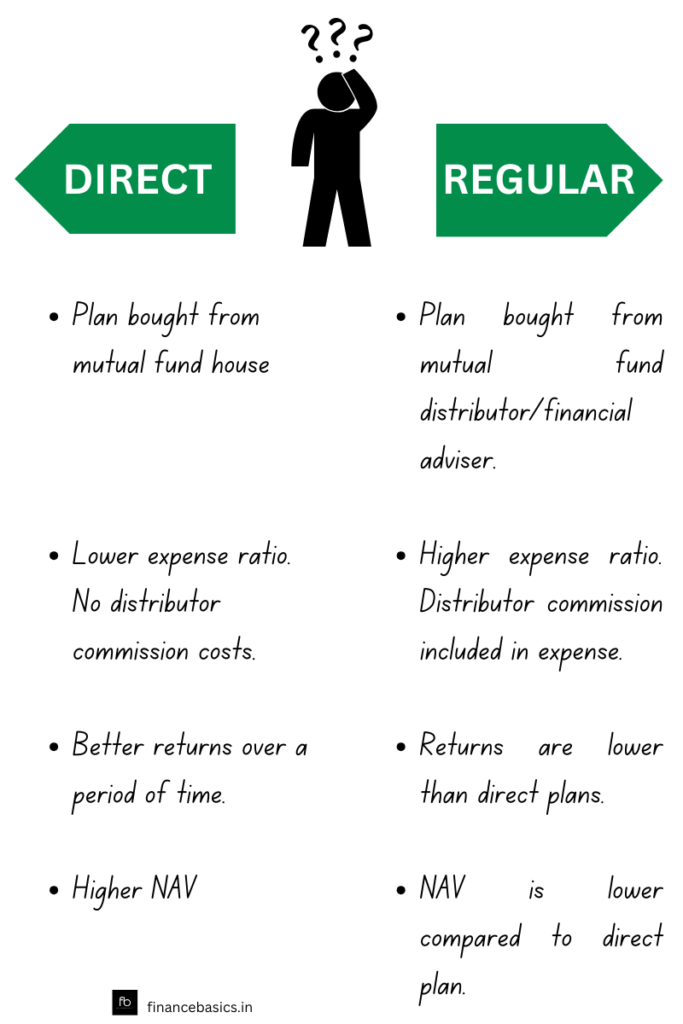All mutual fund houses have direct plans and regular plans for investing. A direct mutual fund plan is bought directly from the mutual fund house. A regular plan is bought from a mutual fund distributor/ financial advisor. The method of purchase also impacts the NAV, the current expense of the scheme and returns. Investors should have a clear understanding of these plans and how the cost affects the returns, so they can make a more informed decision before investing their money.
Table of Contents
Total expense ratio: Direct plan vs Regular plan
Total expense ratio is a fee charged by the mutual fund house to the investor for expenses incurred in providing services to the investor. This fee includes management fees, registrar’s fees, trustee fees, marketing costs and distribution costs. Distribution cost is the commission paid to distributors/financial advisors when they bring new investors to the mutual fund house schemes. The distributors/financial advisors are intermediaries between the mutual fund house and the investor.
Direct plans are bought directly from the mutual fund house. These are bought online on the mutual fund house site or by visiting the AMC office in the city. No intermediary is involved. As a result the mutual fund house does not incur any distribution costs.
Regular plans are bought from mutual fund distributors. Mutual fund distributor provides services like advising investors on which mutual scheme to invest in, submitting investor’s Know Your Client (KYC) documents to the Registrars and Transfer Agents (RTAs) or AMCs, helping investors with the investment process (e.g. submitting application forms, cheques etc to the RTAs/AMCs), ongoing services (e.g. generating account statements, redemption requests etc). For these services, the distributors receive commissions from the AMC as long as you remain invested in the regular mutual fund plans. The mutual fund house adds these commissions to the Total Expense Ratio of regular plans. As a result the Total Expense Ratio of regular plans is higher than the direct plans.
Net Asset Value: Direct plan vs Regular plan
The total expense of a mutual fund scheme are adjusted from the Net Asset Value (NAV). As the expense in a direct plan are lower than the regular plan, the NAV of a direct plan is normally higher than the regular plan. Simply put, the investment value after you have made your purchase will be higher in a direct plan compared to a regular plan.
Returns: Direct plan vs Regular plan
The returns in a direct plan are normally higher than the returns in a regular plan of the same mutual fund scheme. This is mainly because the direct plans do not have distributor commission costs. Lower cost leads to better profits and higher returns.

Just how much do direct plans outperform regular plans?
Direct plans generally perform better than regular plans. The outperformance depends on the investment period. The longer the investment period the better is the performance of a direct plan over a regular plan. Let us understand with an example.
Aboli invested Rs 5,000 in a regular plan and another Rs 5,000 in a direct plan of the same scheme. She continued with both the SIP’s for 15 years.
| Direct | Regular | |
| Investment details | Amount: Rs 9 lakhs Holding period: 15 years | Amount: Rs 9 lakhs Holding period: 15 years |
| Expected return per annum before expense ratio | 13% | 13% |
| Expense ratio | 1% | 2% |
| Expected return after expense ratio | 12% | 11% |
| Total returns (expected returns after expense ratio) | Rs 16,22,880 | Rs 13,94,288 |
| Final Corpus (at the end of 15 years) | Rs 25,22,880 | Rs 22,94,288 |
The direct plan performed better than the regular plan generating an additional return of Rs 2,28,592 over a 15 year period. The final corpus value in the direct plan was around 10% more than the regular plan. So direct plans can add up significant amount of returns in your investment over a period of time.
Conclusion
The direct plans have a definite advantage over regular plans when it comes to investing. However, you need to have some investment experience and knowledge to invest in direct mutual fund plans. You need to devote time in monitoring the performance of your investments and take appropriate actions as and when required. If you need help in making investment decisions like understanding your risk appetite, asset allocation, selecting the right mutual fund scheme, then you should take the help of a financial advisor.
Image credit: Image by freepik



